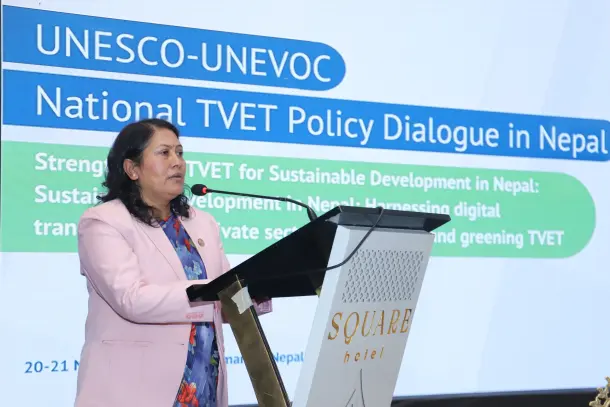Kathmandu: Nepal’s Technical and Vocational Education and Training (TVET) sector is experiencing a transformation with the adoption of a new strategic plan aimed at aligning global best practices with local needs. In order to facilitate the implementation of this plan, a two-day National Policy Dialogue, organized by UNESCO in collaboration with the Council for Technical Education and Vocational Training (CTEVT) and the Ministry of Education, Science and Technology (MoEST), was held in Kathmandu on 20–21 November 2024.

Addressing the National Policy Dialogue, Bidya Bhattarai, Minister for Education, emphasized the government's commitment to inclusive education, including skills and employment for all to realize the vision of a ‘Prosperous Nepal, Happy Nepali’.
“We need to utilize local resources, create job markets, and connect the education system with TVET, and TVET with enterprises. The government should extend all the necessary support. Collaboration and coordination among all levels of government with CTEVT are key,” Minister Bhattarai said.
The event brought together over 100 stakeholders, including Honorable members from National Planning Commission, secretary from MoEST, members of parliament and representatives from Nepal’s education sector, private enterprises, employers, development partners, and donor organizations. Discussions focused on sustainability, digital transformation, and enhancing private sector involvement. Key themes included Greening TVET, Digital Transformation, and 21st-Century Skills for Employability. Participants also explored strategies to overcome local challenges, improve collaboration, and enhance access, equity, and quality in skills development. These efforts aim to prepare Nepal’s workforce to meet the demands of a rapidly evolving digital economy.
“CTEVT extends its commitment to align its activities with TSSP implementation through quality, relevant and flexible TVET delivery,” said Er. Mahesh Bhattarai, Member Secretary, CTEVT emphasizing CTEVT’s mission promoting TVET system to develop a competent workforce for national and international market needs.
Stakeholders assessed global and national TVET trends, identified challenges and opportunities, and exchanged ideas to strengthen the implementation of Nepal’s strategic plan. They also explored strategies to enhance public-private partnerships, integrate greening TVET, and accelerate digital transformation.
A policy recommendation note will be developed to guide the sector's growth, focusing on sustainable practices and private sector engagement. The event underscored the commitment of UNESCO, MoEST, and CTEVT to building a skilled and competitive workforce in Nepal, preparing the country for a rapidly evolving economy.
“Together, we have the power to drive meaningful change, ensuring that Nepal’s TVET system is resilient and prepared to meet the needs of the future” Friedrich Huebler, Head of UNESCO-UNEVOC.
The National TVET Policy Dialogue marked a significant milestone in Nepal’s concentrated efforts to transform its TVET sector. It also underscored UNESCO-UNEVOC’s dedication to empowering TVET leaders in Nepal with the knowledge and tools necessary to drive positive change within their institutions and beyond.